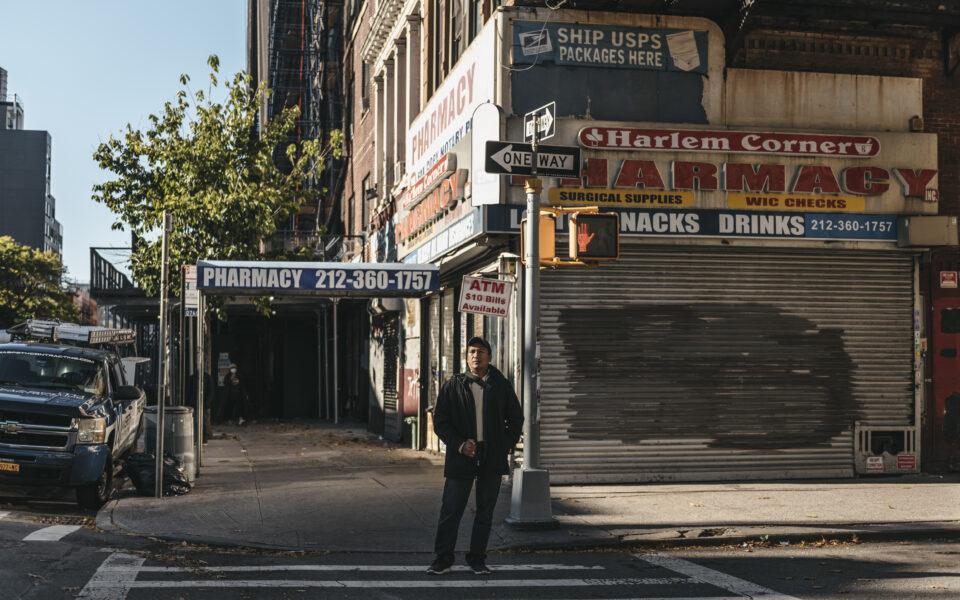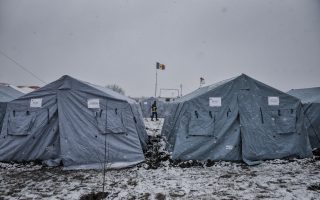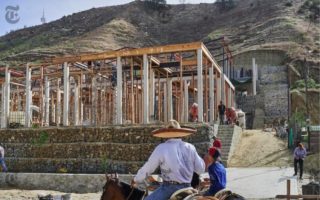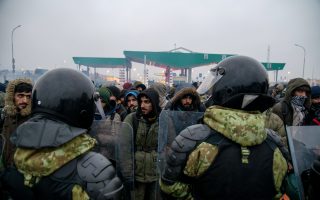After a perilous journey, migrants try to make it in New York City

Alberto Azuna stood on the corner of 125th Street and Third Avenue in Manhattan on a recent morning and adjusted his baseball cap. He squirmed inside a tight winter jacket, then straightened himself. “OK, let’s go down this way,” he said.
His first stop was El Barrista Cafe, a hip-looking joint with a sign that read: “Today has been canceled.” A minute later, he came out, shaking his head. “They didn’t speak Spanish and I don’t speak English,” he said.
On the next block, he crossed paths with a man in a hard hat, wheeling some construction material. “Excuse me, sir,” he called out in Spanish. Azuna explained that he had recently arrived from Venezuela and was looking for work. The worker, José Santos, nodded sympathetically then shook his head.
“I’m Boricua, born and raised here, and even for me it’s hard to get a job sometimes,” he said. “Anything that I know of, I’ll let you know.” Azuna sighed and readjusted his cap.
Since arriving in New York City a little under two weeks ago, Azuna, 38, has been crisscrossing Manhattan on foot, knocking on the doors of dozens of businesses like a canvasser, asking for a job, any job. A former radio host back home, he wakes up at 6 a.m. every day and takes the bus to Manhattan from Randalls Island where he has been staying at a shelter for homeless men.
He is among more than 22,000 migrants who have arrived in New York City since April, many of them Venezuelans fleeing economic and political chaos in their home country. Last month, Mayor Eric Adams of New York declared a state of emergency as the city’s shelters started buckling under the influx of migrants. The city erected a tent encampment near the shelter where Azuna is staying on Randalls Island to provide housing to everyone.
Most want to work. But it could be months before the recent arrivals are eligible to do so legally, under a provision that allows immigrants to work six months after they submit asylum applications. The process will drag on for many, and the opportunity is unlikely to be permanent. Courts were already straining under a backlog of asylum applications: Azuna has his first appointment with immigration officials in July 2025. And for most migrants, asylum status is a long shot – escaping economic hardship is not grounds for asylum.
While there is work to be had in the city, many jobs require a work permit. So, with few financial resources and slim chances of being granted asylum, Azuna and thousands like him are likely to join the underground economy and the more than half a million workers who already live illegally in New York City.
Azuna made his third attempt of the morning at Sandy Restaurant, a Dominican eatery, where he told a woman behind the counter, “I’ll do anything – wash dishes, cook. Look, I can even drive a cement truck.” She shook her head. “We’re full. Completely full,” she said.
Leon Ramirez, the owner of Sandy Restaurant, said that “hundreds” of migrants from Latin America have been knocking on his door. “I’ve never seen this many. I see more than 10 Venezuelans a day, and young kids, 16-year-olds – they are dying for jobs. But we have all that we need and the cost is too much.”
For Azuna, arriving in Manhattan was the culmination of weeks of dangerous trekking across Central America, including through the thick, swampy forests of the Darién Gap in Panama. Azuna recalled seeing corpses and children who had been left behind by parents who had died from exhaustion or injuries.
Like many others, he brought little with him and shed other possessions along the way. All Azuna has left is a plastic folder that he carries with him at all times, containing his passport, 50 Mexican pesos, which is about $3, some medication to treat ulcers and indigestion, a small book containing verses from the New Testament and the Psalms, and a photo of his wife and two daughters, one of whom was born just five months ago.
In New York, the game of survival continues, albeit of a different kind. Immigrants lacking permanent legal status are generally more vulnerable to abuses by unscrupulous bosses, including middlemen in the construction sector, some of whom are already paying migrants half the $15 minimum wage required by the city. But unlike other nationalities, many of which have established communities and social networks in the city, many Venezuelans have few relatives or connections to rely on for advice or financial help.
The city has provided a level of support for this wave of migrants that may be unprecedented, including setting up a shelter with areas for sports and video games and giving migrants Electronic Benefits Transfer cards to purchase food. Still, there are some hurdles. Some of the EBT cards have been defective – Azuna discovered there was no cash on his, and he had to go to an office in Brooklyn to sort it out. With no money to pay for a subway card, he relied on the kindness of strangers and lenient subway workers who let him pass. “When I say I’ve just arrived from Venezuela, they say go ahead,” he said.
Then, there is a bureaucratic scramble to get any kind of identification to show potential employers. To get a job in construction, workers need a certificate from the Occupational Safety and Health Administration, which can cost as much as $400 and require 40 hours of training on basic safety.
At La Colmena, a community-based organization on Staten Island that provides free OSHA training, demand for certificates is so high that there is a waiting list of 200 people until June, said Felix Guzman, an organizer and OSHA instructor.
Big construction projects require workers to present OSHA certificates, but the rules may be more blurry for private residences, said Stephen Handlik, a licensed site superintendent who works for the Rinaldi Group, a construction management company. He was overseeing the site where Azuna had stopped to talk to Santos, one of the construction workers.
“You can get away with it because there is too much construction going on for any government agency to oversee not only these bigger projects but every home,” Handlik said.
He gives a short list of requirements to people who come looking for a job: “The first thing I tell them is that I need a résumé: Do you paint? Are you a welder? I don’t know your experience. Then I need a legitimate address where I’m sending the paycheck to. Then you need OSHA training so we’re kosher with OSHA.”
Terry Antonio Mujica and Junior Rojas arrived three months ago from Caracas, Venezuela, and met at a homeless shelter. They found jobs fairly quickly, one in construction and the other in a laundromat, but are paid half the minimum wage. In a day, both men make about $55 for about seven hours of work. Still, it feels like a bounty to them.
“What you earn in a day here can pay for one week’s worth of food back home,” said Rojas, 28, who has five children between ages 3 and 13.
“It was worth making the trip, a hundred percent,” added Mujica, 29, who has four children and sends money via Western Union on his cellphone, which was donated to him.
As a day laborer, Mujica does not know when he will work until the day before, when he receives a call from a foreman at a construction site in Queens. After getting off at a designated subway station he walks to a deli where he is whisked away in a van to the site where he works in demolition.
Rojas, who was wearing a New York Yankees baseball cap, said he was hired at a laundromat by a Puerto Rican employer. His boss is only able to pay half the minimum wage, but “I’m grateful for the job,” he said, taking a break to receive a call from his wife.
“Thank God they are well, because I can’t bring them over,” he said of his family. “It’s too expensive and it’s awful to cross the jungle. I don’t recommend that to anyone.”
When he was traversing the Darién Gap, an armed gang with revolvers appeared and robbed other migrants. “They stole from the Haitians, not the Venezuelans, because they already know the Venezuelans come with nothing. They know who has money and who doesn’t,” Rojas said.
Back in East Harlem, Azuna continued his job hunt along 125th Street. He noticed a handwritten sign in Spanish on the window of a quesadilla shop advertising jobs. A worker was heating up a flattop grill to serve lunch to customers. Azuna leaned over to talk to him through the open window.
“Where are you from?” Azuna asked, with the easy banter of a radio host. “Mexico City,” replied the worker, who said his name was Jonathan. “I’ve gone through all the countries in Central America and Mexico City was the most beautiful,” Azuna said, smiling.
“Yeah,” Jonathan responded. He seemed to know where the conversation was headed. “You need an ID and a tax ID if you want to work here, and a certificate from the health department for food manipulation,” he said. “I mean, you need to know how to cook, too.”
“I used to drive a truck in Venezuela where they transported food and meat,” Azuna said.
“For that you need a certificate too,” the worker responded. “Good luck.”
This article originally appeared in The New York Times.






